I’m going to lead with something my fellow writer Adam said after our very first games of Space Lion last year: “Never before have I seen a board game that has so much careful strategy and still causes so much bullshit at the exact same time”.
And you know what? He’s right. Space Lion is a board game about galactic warfare, and it that packs an intense strategic and tactical wallop into a small box while also creating plays that have players outright shouting in surprise, laughter, or even frustration as what seemed to be a perfectly logical move gets turned upside down.
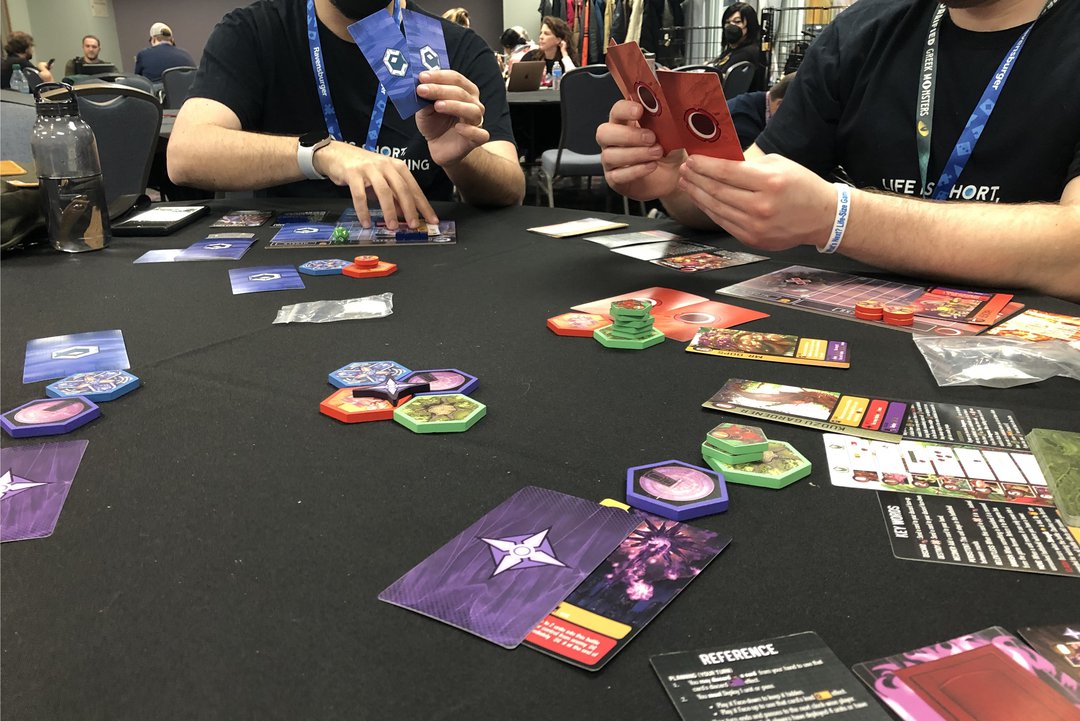
What you are left with is a game that punches above its weight in terms of price, size, and gameplay. It’s wonderfully designed, beautifully evocative while still minimalist, and I’ve had some amazingly fun games of this at my table. At the same time, thanks to quirks in its gameplay, I don’t think it will be everyone’s cup of tea. Are you ready to lead a space empire to victory against bizarre odds? Let's find out.
What Is Space Lion?
Space Lion is a 1-5 person semi-asymmetrical card game where armies go to see who is the strongest. However, unlike direct head-to-head battles like Magic: The Gathering, you prove your dominance by fighting over battlefields during a series of rounds. Each time you take battlefield, you earn medals, and if you have the most by the end of the game, you win!
The battlefields are determined by putting wooden markers with your factions symbol out on the table, connecting them with others. You will always be fighting on three fronts: one battlefield with the player to your left, one battlefield with the player to your right, and the third one put in the center of the table that everyone has access to. Normal battlefields are worth one medal, while the center field is worth two when playing with more than two players. A game lasts long enough for each player to have one round as first player, or at smaller player counts, two rounds.
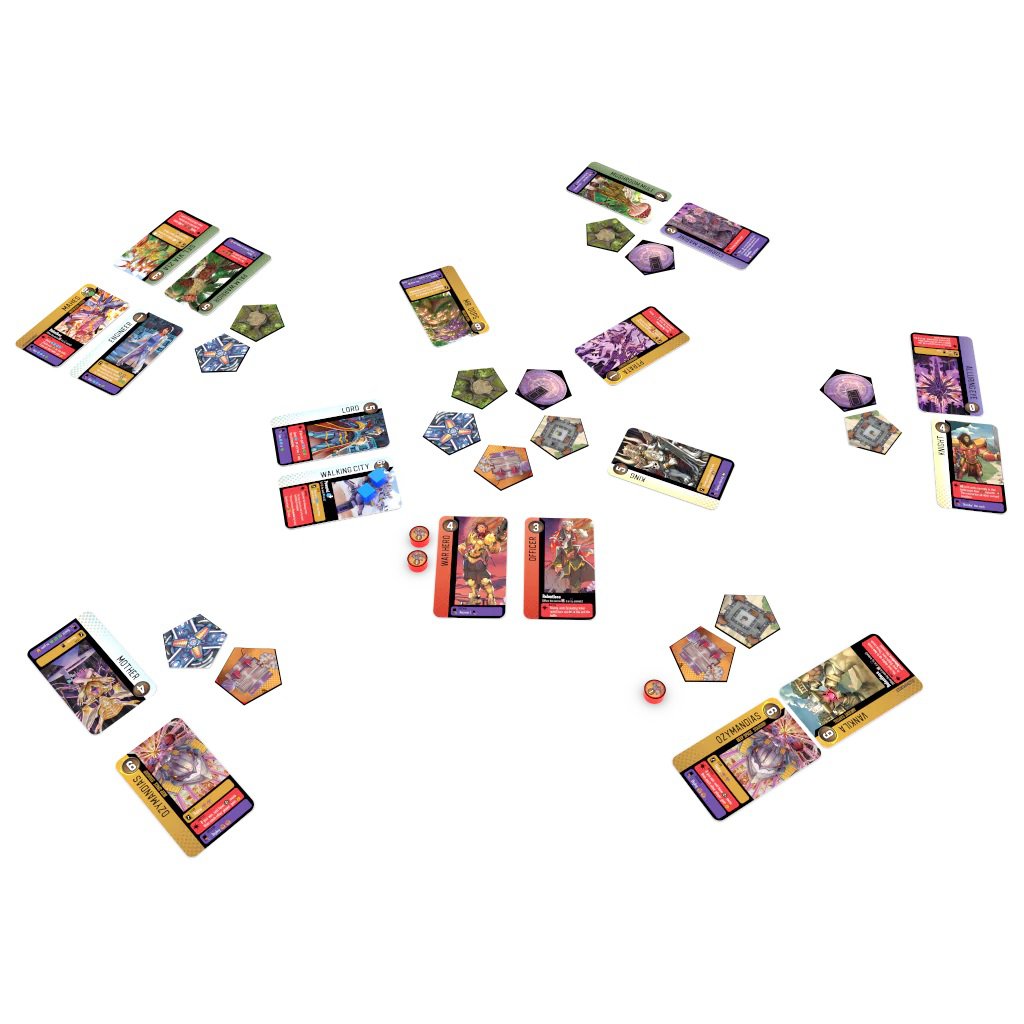
Here is an example of a five player game. You’ve probably already realized that player count changes a game of Space Lion significantly.
During each round, you’ll go around the table four times, possibly discarding a card to get a benefit, but always having to place a card each turn at a battlefield of your choice. Each player has 7 cards with power levels of 0-6, and at the end of each round, the player who has the most power on a battlefield wins it. If you have just one card on a battlefield, it goes to your discard. If you have more than one, the cards go to your destroyed pile instead. Then, you pick up all cards in your discard to your hand, your destroyed cards go back to your discard, and you are ready for the next round.
Most medals wins. Simple, right? …Right?
The Chaos Of War
One reason why Space Lion is so wildly successful at being a territory/war game that plays fast is because it has such a distilled simple essence. The basic rules are incredibly easy to teach, and by two rounds, everyone I’ve ever taught this game understood the game’s essentials and essence. However, in a twist you’ve heard too many times, this is one of those games that constantly takes its own basic rules and riddles them with so many exceptions that it can become unrecognizable.
As an example, let's take the humble power 1 card from the Leon army, the hacker.
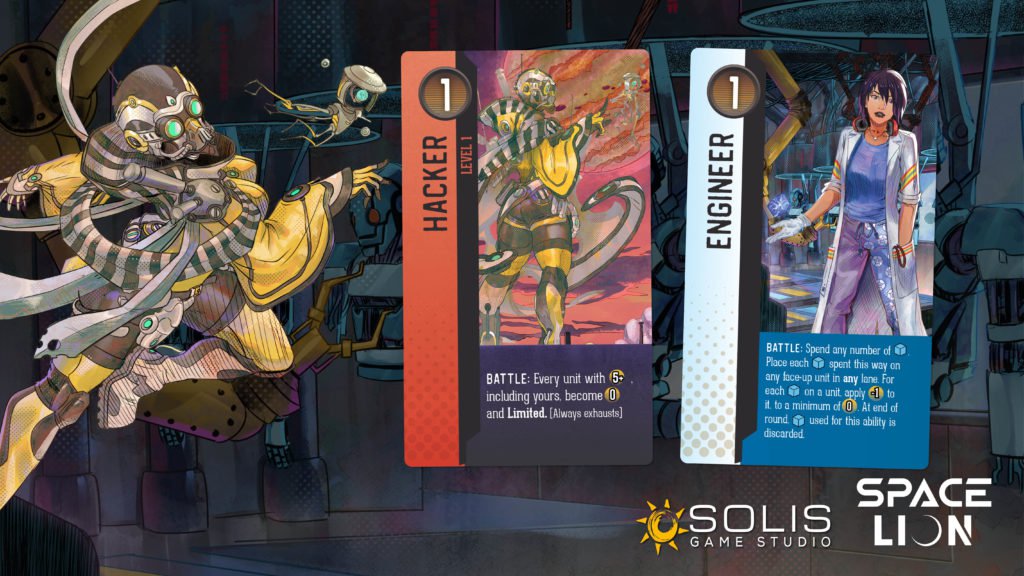
This is a fairly straight forward card. It has just one power, so not worth much. You could choose to discard it in order to play a 1 power token to a battlefield and then play a higher power card instead, which is absolutely valid. However, its battle effect can flip a battle upside down: every other card that is played to that battlefield with power of 5 or higher instantly becomes 0.
Folks, when I tell you I’ve seen battles where players bring a city sized gundam, a straight up space cruiser, and an eldritch horror from beyond the veil to a battlefield to duke it out kaiju style… only for them all to lose because this little nerd says ‘nah, I’d win’ and punches a few buttons on his computer? It’s amazing. It’s a moment where people take all this time to tally up their power totals and then freak out as one card carefully played upends all of it.
Make no mistake, plays like this can happen through luck, but there’s real strategy here. You see, cards can be played facedown when sent to battlefields. Some cards are played faceup because they get an extra benefit (an ability in yellow background on the card), but you should always be watching your opponents and sizing them up. Would your opponent play their biggest unit to the center, or just try and snipe out one medal to the side? What cards are in their discard? What cards are facedown in their destroyed pile?
There is so much gameplay here, and all each faction has is seven cards to play with. Well, mostly.
Glorious Asymmetry
Building on how every card has special rules is the fact that each army is wildly different. There are five different options in the box, and their style varies from playing with discarded cards to literally teching up so they are unstoppable in the end game. So I don’t get bogged down raving about the quirks of each, let me quickly list them out:
- The Leon Army - Adaptive Cowboys. Listed as the simplest faction, they are jack-of-all-trades whose adaptability still make them have a high skill ceiling. They don’t start out with a Space Lion (More on that later), but instead can promote multiple throughout a game. Choosing who you upgrade mid-game can allow you for a few surprise wins. Oh, and their power 5 card can drop a tactical nuke once a game, destroying an entire battlefield for a full round.
- The Kudzu - Persistent Predators. The green faction is all about carnivorous plants that slowly creep over their battlefields. While the leon army can manage to put out 1 power tokens occasionally, this faction throws around tokens with nearly every action. Even worse, the tokens stick around unless they are defeated in battle, so letting them build up over rounds is a fatal mistake.
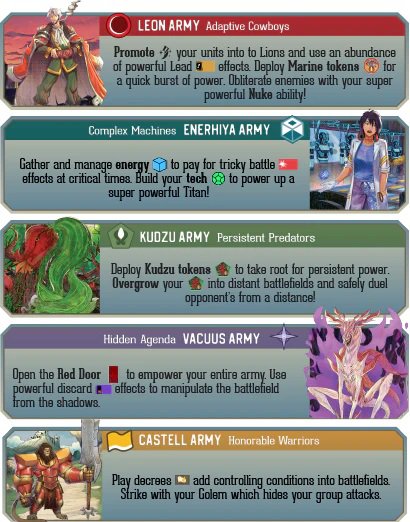
- The Enerhiya - Complex Machines. The secret power of this blue faction is how they have energy cubes to store up to activate special effects while triggering a ‘tech dice’ to level up. Their 0 strength card is a mecha titan that can grow up to strength 10 with careful manipulation, while their walking city can be powered up to walk between battlefields, persisting between rounds.
- The Castell Army - Honorable Warriors. Somehow, this yellow faction reads as being incredibly straightforward while being considered one of the most complex. Noble lion-people, they really enjoy improving their strength, while their biggest card can let you smuggle in multiple cards to one battlefield without them being destroyed. Their most complex rule is their decrees, where every round they force one battlefield to change a rule. Will it benefit them? Only if you are smart.
- The Vacuus - Just The Worst. This is your ‘you know, The Forces of Chaos have a point’ faction, leaning into the idea of corruption and cosmic horror. They love taking cards from their discard, love taking your discarded cards and destroying them, and destroyed cards can empower them. To make everyone love them even more, they have a nasty trick where if they get to ‘open the red door’ early on in a round, all their units get nastier and won’t stay dead long.
I am sure that every style of gamer will find the style or flavor of a particular faction to be intriguing. I’ve played each, and found fun with each’s approach to the basic problem of battlefield control. I thought the Castell would feel too straight forward for me, but their cards require careful deployment to maximize strength bonuses, making you feel like an army commander sliding forces into proper position. It’s a rush to deploy a ten strength titan with the Enerhiya, and the fact that the Leon army has their finger on a giant red button allows for very fun mind games.
There’s one more twist that gives Space Lion an incredible amount of replayability. While each army goes into battle with just 7 cards, there are actually 14 faction cards for each group. You see, for every single card in the game, from strength 0-6, there is an upgraded version, called a, you guessed it, Space Lion.
Let's take the strongest unit in the Kudzu army, the Kudzu Sage.
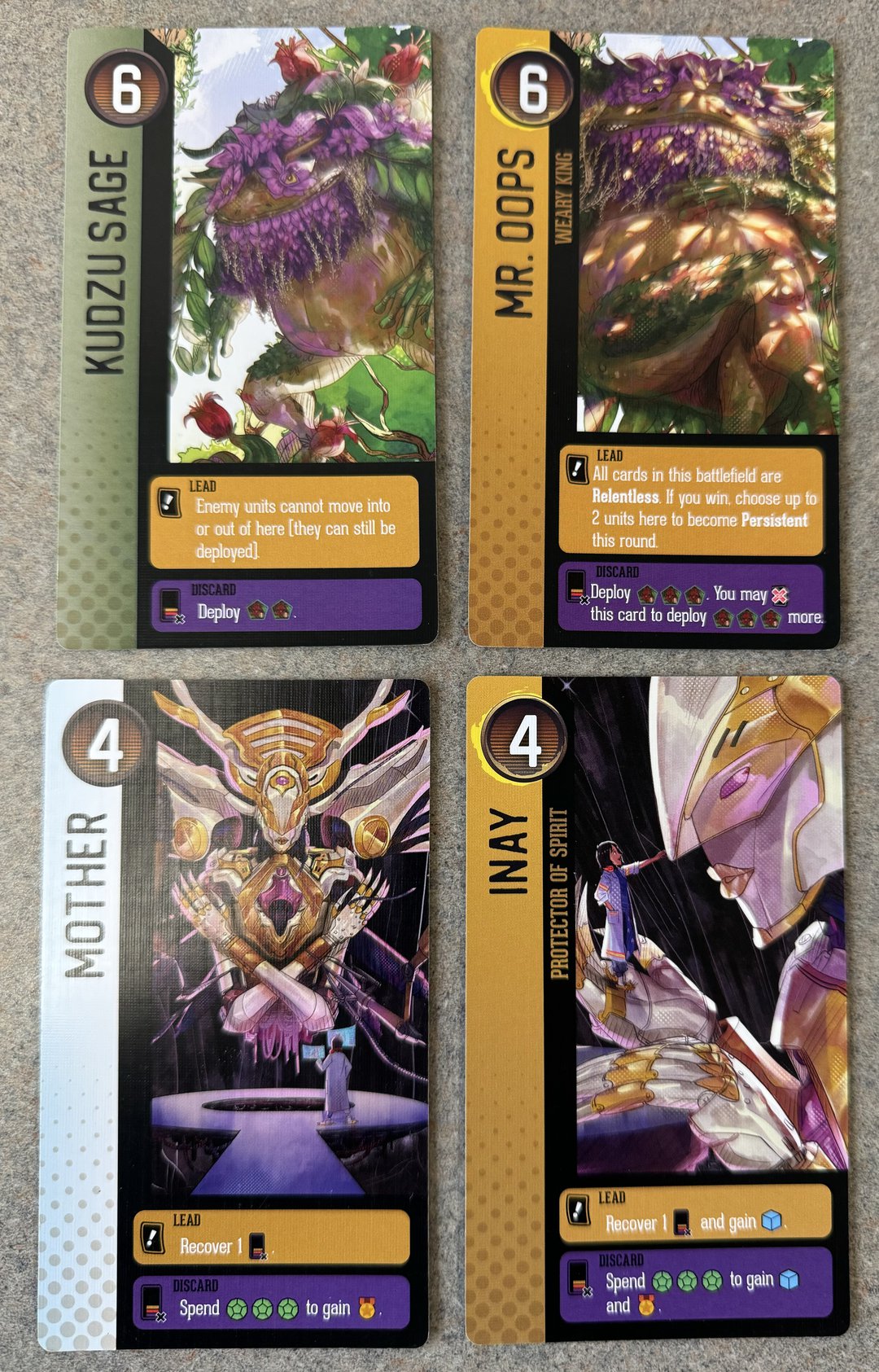
This giant sentient frog/venusaur is good! If you play him face up, it locks down that region. If you for some reason want to discard him, you can play two plant tokens. However, if you decide to make this card your Space Lion, it becomes the fabulously named Mr. Oops. My tables LOVE Mr. Oops, because he makes everyone where he is relentless, a keyword that means even if cards would normally be destroyed, they are just discarded. It takes a battlefield and makes it feel like a Super Smash Brothers Level, where everyone shows up, piles in and the power numbers get really high indeed. As a second example in the picture above, you can see how the Enerhiya’s 4 power card becomes named, improving your ways to recover other cards from discard and get energy cubes in the process.
All these little shifts in card abilities then interacting with every other card on a battlefield creates game states that can feel entirely unique every time you play. Even doing repeat games with the same factions, if everyone just changes who their heroic character is can fundamentally change who would win in a fight, or who gets their destroyed cards back faster. I can’t state enough how much variability is stuffed into a game where you technically only have 7 cards to play.
The Shifting Battlefield of Player Count
At time of writing, I’ve played Space Lion about ten times, and I’ve taught about sixteen different players the game. The typical reaction to someone’s first game is some confusion, then understanding, then absolutely surprised glee the first time they watch a battlefield turn into an upset. Maybe one player really thought they had a location locked down with multiple cards, but a revealed hacker at the last second upsets the balance of power. Maybe the Castell army plays their card which lets them suddenly double their power score… either way, the verbal responses usually range from “Wait, what just happened?!” to “Can I see that card, how did you pull that off?” to just delighted laughter.
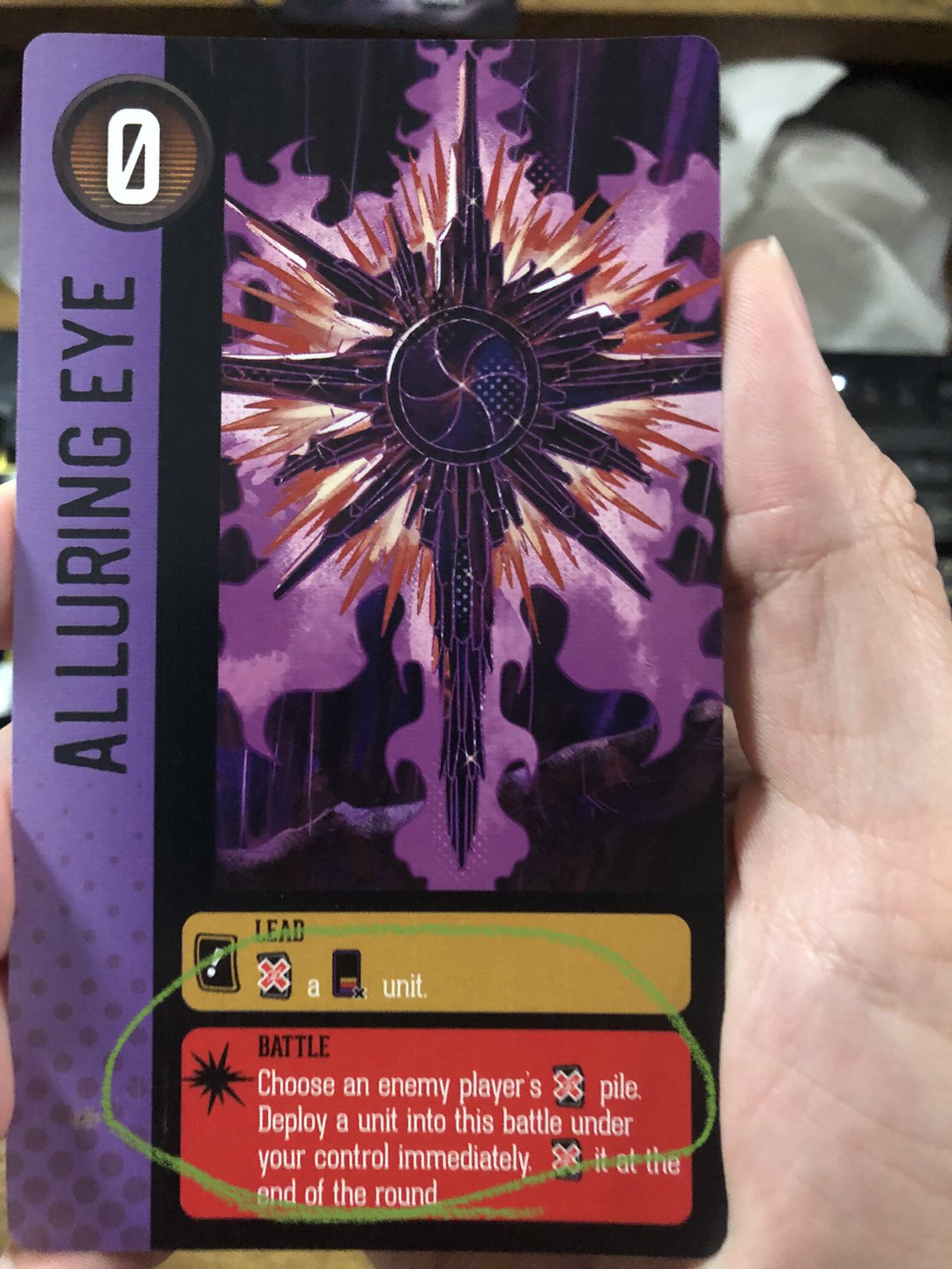
Every card in the game has a way to cause upsets or get advantages. The 0 power card for the Vacuus faction proves how they can be total jerks... and why I often don't play them against brand new players.
Part of this magical moment is thanks to the fact that in larger games, you don’t have direct control over all the conflicts going on. Playing across my friend’s Kudzu army, it can be in the third or fourth round where he suddenly plays a card that drops ten plant tokens into a giant wall in the center. It was a move maybe I could have seen coming, but instead I was busy fighting off my direct foes to the left and right. In a five player game, two opponents can get into a protracted rivalry to the point where it can be easy to lose track of what they are playing across the table, so when a massive melee for the central battlefield happens and everyone’s plans all come into conflict, it can be a hell of a moment.
There is a solo version of Space Lion which is perfectly serviceable, and a two player game can be this intense battle of wits. With people choosing to play cards facedown to set up traps and sneaky plays, it can very much feel a bit like Netrunner bluffing and countering. However, the game really seems to shine as the player count gets higher, and the sense of playing through a battlefield that’s out of your direct control becomes tangible. Space Lion when played at high player counts is a hot mess, and that’s sort of the point. The battles begin, weapons are unleashed, the dust settles, and in an hour you see who’s won despite all that was thrown against them.
Okay, Maybe Too Much Chaos
This is, unfortunately, where I’ll have to get to some of the negatives of this game. I don’t think any of these are dealbreakers, but I do think that it's important for you to understand what you are getting out of Space Lion. As I’ve mentioned before, this is a game that revels in creating chaotic moments and rewards players for adapting to the madness, planning ahead, and anticipating other player’s moves. Sometimes, when that planning goes wrong, it goes very wrong.
The worst game I think I’ve seen played was when someone trying it out decided they didn’t want to win, they just wanted to see someone else lose. Vacuus has some really powerful, really nasty tricks that can keep putting discarded cards into the destroyed pile, and played enough rounds in a row can effectively lock a card down all game. Player one decided to do this to player two, even though they weren’t winning, souring the game harshly. The higher player count games are a lot of fun in Space Lion, but only if everyone is mad-dashing for medals. If someone starts to play kingmaker on purpose, the balance of the game wildly spirals out of control.
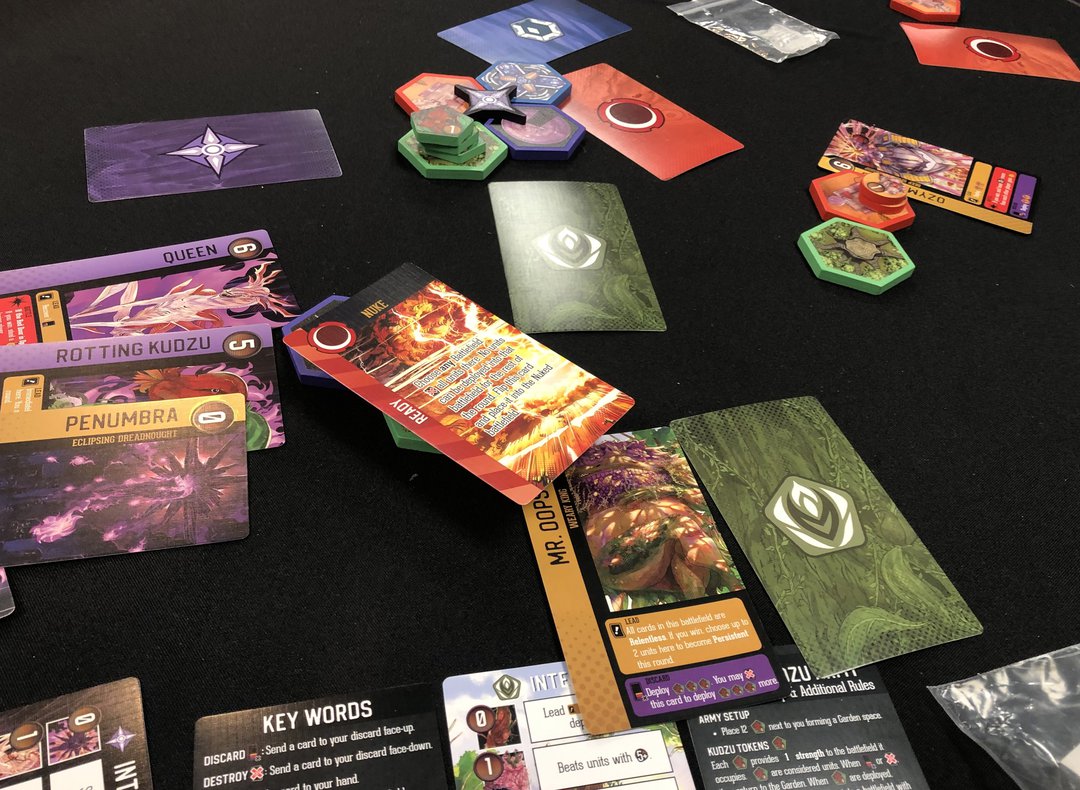
In a 4-player game, here's where Eric used a nuke on me and another player after we had both over-committed to the fight. It was a brilliant move that made us all laugh... but might feel unfair to those who prefer games that are more predictable.
Jumping off that last point, sometimes there’s going to be a round where things don’t feel great. Let's say on your second round, you over-committed to two battlefields, using every trick you could, hoping to score a bunch of medals. Sometimes this works, but other times someone else’s special rules can override yours, leaving you next turn with only 2-3 cards in your whole hand, effectively sidelined and nursing your wounds for a full round. It’s not the end of the world, but I’ve seen it leave some players with a bad taste in their mouth as they feel sidelined and unable to catch up.
The complaints above can be frustrating, but I’ll work in a caveat that Space Lion is a game that moves fast. If you are playing with 4 players, you only have 16 turns of playing one card and maybe discarding another. If it's not a learning game, you can play a full game in an hour even at higher player counts. The longest game I had was a 5 person game that took just under 2 hours, and that was because four of them were brand new and we were playing in a cafe, with lots of shouting and ‘oh did you see that move?!’ reactions. Some of these small frustrations would be agonizing in an expensive 3-4 hour board game, but because this is a game that can play fast, you can get absolutely demolished one game and still have time for another.
…Which brings me to one negative that can slow down your game pretty badly, and that’s some of the rules. I want to say that Space Lion is at its best played fast; be clever, come up with ideas, but you have to keep the pace up because if you try and take absolutely everything into account, analysis paralysis will get you. This is where I wish the rulebook an FAQ of more examples about turn order and priority, because this question comes up often. You see, whoever has the first player token, or priority token, plays first, but also chooses which battlefields are resolved in what order. It also determines the way all the special rules trigger.
Let's say the Hacker brings people with strength 5+ down to zero, but the Castell player goes next, so their War Lion gets extra strength for each other cards at that location, going above that 5+ strength. What happens? Well, it depends on priority: if the Leon player with the hacker goes first at that battlefield, the hacker will trigger, then the War Lion card will buff up, essentially giving the battle to the Castell player. If the Castell player has priority, he’ll buff up first, then the hacker will giggle and zap them down to 0.
This feeds back into that quote from Adam I have at the top: there are so many over-the-top abilities being played it looks like utter chaos and BS, but if you are playing at a table where everyone has played a few games before, you’ll have people checking which cards are in discard, determining whose abilities are triggering first each turn, and so on. There is a deep complexity to this game that isn’t immediately apparent, and I’ve seen rules questions about priority come up in multiple games. For me, it was a hiccup, but for others, it can be a dealbreaker.
Space Lion’s Multiplayer Battlefield Is Worth Your Attention
Now I just spent a lot of time going over various negative aspects of Space Lion, so it might seem like I’m against the game. I’m not; this is a game that is going to stay in my collection for a long, long time. I really think there’s a lot of fun magic in Space Lion, as it rewards deep strategy in a way a lot of faster casual games don’t, but it still has some of the fun and panache of quicker games. It was almost a year ago, but everyone who played our first games together still remembers the first time Eric dropped a nuke on a battlefield, annihilating my forces and my friend. There was a very low “Are you kidding me right now?” that was muttered, and everyone laughed so hard we had to pause for a minute or two. You can’t put a price on great gaming moments like that.
 Space Lion
Space Lion
Author: Chris Solis
Publisher: Solis Game Studio
Number of Players: 1-5
Play Time: 30-90 Minutes (Player Count Matters)
Price: $30 for retail, $60 for deluxe
Review Copy Information: A Review Copy Was Given By Publisher
This is a good game, even a great game, with the caveat that it can sometimes feel a bit fiddly or fragile if people don’t take time to learn about how priority works. It’s fun and bombastic while still letting you feel like a military general. It’s also incredibly affordable, with the basic edition only being $30. I played with the deluxe version which retails at $60; the deluxe adds wooden base tokens that I really like, as well as the solo expansion and another expansion called Turncoat that adds in new heroic cards that can be used in two different armies each. However, after 10+ games, we still haven’t played with that expansion just because each game already has so much variety between choosing different armies and a different leader each time.
My final verdict is going to come back to the back-of-the-box quote from the developer: if you like the very good Air, Land, and Sea two player dueling game from Arcane Wonders, or even Marvel Snap, this is a game you really should check out if you want to see that style of game expanded on. Playing in these massive battlefields with multiple players at once is a game space that is strange and interesting and most importantly, fun. Yes, it creates more strange game states and even unwinnable scenarios, but that is sort of the point. I love the bizarre situations this game puts me in and challenges me to come out on top of.
If you want a straightforward version of this game style, go and get Air, Land and Sea for a fantastic two player game… but if you want to get weird, play with many friends, and have fun watching a sentient black hole summon the dead to fight a giant gundam mecha while giant plants wait in the wings to overwhelm them both, you can’t go wrong with Space Lion.